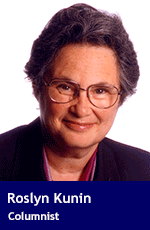 “The rich are getting richer, the poor are getting poorer. Where are the jobs? And we don’t even want to talk about what is happening in America.”
“The rich are getting richer, the poor are getting poorer. Where are the jobs? And we don’t even want to talk about what is happening in America.”
This gloomy recital often follows if I reveal that I’m an economist (a practitioner of the dismal science).
But this very widespread perception of the economic world is way too pessimistic. In fact, recent numbers show it’s just plain wrong.
Let’s start by looking at the United States, where many believe that the one per cent are getting richer and everyone else is watching their situation deteriorate.
The latest U.S. census shows a very different picture. The median household income from 2014 to 2015 rose 5.2 per cent or $2,800. This is real income, adjusted for inflation. The median is the level at which half the households are below and half above. Growth between two and three per cent is more usual even in good times.
Rising incomes are being enjoyed across all geographic regions and age groups. Blacks and Hispanics were better off. In fact, the only group that didn’t see any increase were Asian Americans. The poor, far from getting poorer, were getting fewer. The poverty rate fell from 14.8 to 13.6 per cent, lifting 3.5 million people out of poverty. The number of full-time jobs rose by 2.5 million.
We won’t have comparable detailed census information in Canada for a while, but the numbers we do have are pretty good. Household disposable income in Canada, according to the most recent figures, is growing at a very respectable 2.7 per cent. Since inflation is less than two per cent, this means real incomes are rising.
British Columbia is doing even better than Canada as a whole. We have an unemployment rate of 5.5 per cent, close to the U.S. and as low as it’s been for a very long time. This compares to a seven per cent rate across Canada – not great but below recession levels. Average weekly earnings are growing in B.C. And most people must feel pretty comfortable about their situation since spending is growing at 5.2 per cent.
In many respects, Canada’s economic prospects look brighter than those in the States. A recent Fraser Institute report ranks Canada fifth in the world in economic freedom. The U.S. ranked 16th. So Canada looks good as a place to do business, and generate jobs and earnings.
On the political front, Canada practically glows. We have a sane, effective government, a respectable fiscal situation compared to most other similar countries and as much certainty as the real world offers about our long-term stability. The same can’t be said about the U.S. leading up to November’s presidential election.
A little gloating may be justified but we shouldn’t be too complacent. To continue to prosper we need two things: workers to produce goods and services, and customers to buy them.
Although more than five per cent of the workforce is unemployed, B.C. has labour shortages at both ends of the spectrum. At the unskilled end, employers in restaurants, retail and related sectors have real trouble finding enough bodies to do the work. Long term, Canadians rarely take those jobs. Nor is the recent increase in the minimum wage likely to create a sudden increase in the supply of workers. Recent changes to access to temporary foreign workers created gaps in jobs that those workers had filled.
At the high end of the labour market, people with 21st century skills are rare. This includes trades workers, STEM (scientific, technical engineering and mathematics) professionals and business executives who can operate at a global level.
Canada can’t thrive on its domestic market alone, even if we all spend more. We are an exporting country and need access to global markets, not just the U.S., our biggest trading partner.
Nor can we take the American market for granted. The lack of a softwood lumber agreement with the U.S. threatens one of B.C.’s most important export products and protectionist sentiments being expressed in the U.S. election could threaten much more. We need more than one customer and that means freer trade with Europe and Asia. Trade agreements put forward in both those regions are far from certain.
The more Canada can do to gain and keep global customers, the more prosperous all of us will be. We need to keep the economic news from being a recitation of the dismal science.
Troy Media columnist Roslyn Kunin is a consulting economist and speaker.
The views, opinions and positions expressed by columnists and contributors are the author’s alone. They do not inherently or expressly reflect the views, opinions and/or positions of our publication.
